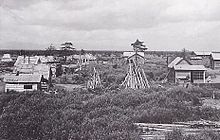- Dahinien Gendānu
-
Japanese name Kanji 北川源太郎 Rōmaji Kitagawa Gentarō Dahinien Gendanu Katakana ダーヒンニェニ・ゲンダーヌ Rōmaji Dāhinnieni Gendānu Dahinien Gendānu, also Daxinnieni Geldanu (c. 1926–1984) was an Uilta activist from Sakhalin.[1]
Contents
Life
Gendānu was the adopted son of Dahinien Gorgolo, an Uilta shaman. Like most members of his people at the time, he was unclear on his exact year of birth.[2] In his childhood, his home village of Otasu[3] was ruled as part of the Karafuto Prefecture of the Japanese Empire. He received the Japanese name Kitagawa Gentaro.[4] After the surrender of Japan ended World War II, he was interned in a prisoner-of-war camp in the Soviet Union for seven years. Following his release, he migrated to Japan in 1955. However, his requests for a pension were denied because of the Japanese government's position that Uilta and Nivkh people from Sakhalin were ineligible for armed service and had been illegally recruited. He died in 1984 without pension or compensation from the Japanese government.[5]
Legacy
In Abashiri, Hokkaidō, Gendānu established a museum of the indigenous peoples of Sakhalin, the Jakka Dukhuni, meaning "keeping place of treasures".[6] His autobiography was published in 1978, in collaboration with Ryō Tanaka, a high school teacher in Abashiri.[7][8] His niece Lyuba Nakagawa had remained on Sakhalin. In 1995, she visited Tokyo as an emissary to request Japanese government assistance in constructing a memorial to Uilta war dead, as well as other compensation and support; however, she received no response.[9] Tanaka would go on to become the president of the Uilta Kyokai, the Uilta rights association which Gendānu founded.[10] The Uilta language data elicited from Gendānu and his father by Fumio Koizumi would form the basis of later linguistic studies by Shirō Ikegami and Toshirō Shimagari.[11]
Works
- 田中了 (Tanaka Ryō); D. ゲンダーヌ [D. Gendānu] (1978), 『ゲンダーヌ : ある北方少数民族のドラマ』 [Gendanu: Drama of a northern minority], 現代史出版会 [Gendai Shuppankai], OCLC 24385988
Notes
- ^ Suzuki 2009
- ^ Suzuki 2009
- ^ オタス; administratively part of Shisuka, which is now known as Poronaysk
- ^ Minichiello, p. 170
- ^ Morris-Suzuki 1996, p. 20
- ^ Morris-Suzuki 1996, p. 20
- ^ Suzuki 2009
- ^ Tanaka & Gendānu 1978
- ^ Morris-Suzuki 1996, p. 21
- ^ Suzuki 2009
- ^ Ikegami & Shimagari 1990
References
- 池上二良 [Ikegami Shirō]; 津曲敏郎 [Shimagari Toshirō] (March 1990), 『北川源太郎筆録「ウイルタのことば」』 [Gentarō Kitagawa's written records of Uilta], ウイルタ民俗文化財緊急調査報告書 [Urgent Investigative Reports on Uilta Cultural Heritage], 北海道教育委員会 [Hokkaidō Education Committee], NDL 93003811
- Morris-Suzuki, Tessa (1996), "Divided Lives: A Story of Indigenous People and the Pacific war", Asia-Pacific Magazine (1): 17–21, http://coombs.anu.edu.au/SpecialProj/APM/TXT/morris-s-01-96.html, retrieved 2011-01-28
- Minichiello, Sharon (1998), Japan's competing modernities: issues in culture and democracy, 1900–1930, University of Hawaii Press, ISBN 9780824820800
- 上原善広 [Suzuki Tetsuo], "「平和の島」が「スパイの島」に [From "Peace Island" to "Spy Island"]", Kodansha G2 4 (2), http://g2.kodansha.co.jp/177/224/458/459.html
External links
- Uilta vocabulary elicited from Dahinien Gendanu and Dahinien Gorgolo in February 1968 by Koizumi Fumio (小泉文夫)
- Uilta Kyokai, an association founded by Gendānu in 1975
- ゲンダーヌは、市他所の世話で鉄工所で働いた。
Categories:- 1920s births
- 1984 deaths
- Japanese prisoners of war
- Orok people
- People from Sakhalin Oblast
- World War II prisoners of war held by the Soviet Union
Wikimedia Foundation. 2010.

